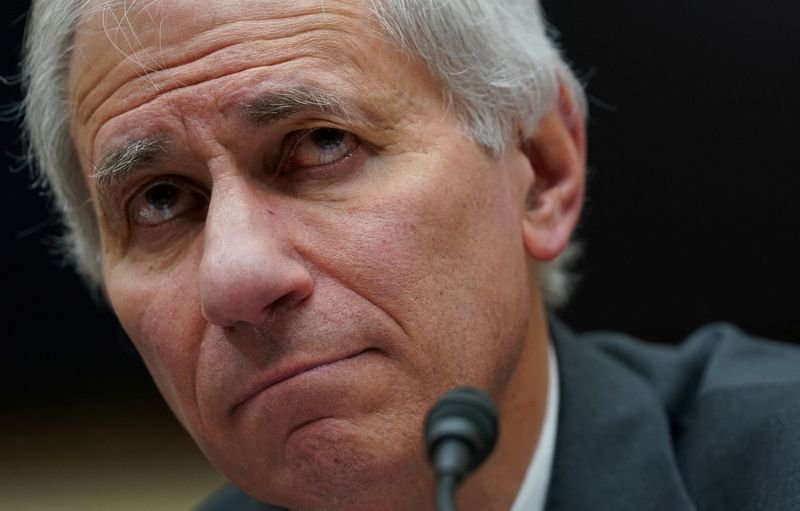By Pete Schroeder
WASHINGTON (Reuters) -Large regional banks would have to issue roughly $70 billion in fresh debt under a new rule proposed Tuesday by U.S. banking regulators, part of a broader effort to bolster the resilience of the sector after three lenders failed earlier this year.
The proposal - issued by the Federal Deposit Insurance Corporation (FDIC), the Federal Reserve and the Office of the Comptroller of the Currency - would bring banks with over $100 billion in assets more in line with the largest Wall Street giants, which already have their own debt requirement.
It follows a tumultuous spring for regional banks in which Silicon Valley Bank and two other lenders collapsed, forcing regulators to backstop deposits to stave off a broader panic.
FDIC Chairman Martin Gruenberg argued that the crisis showed smaller banks need stricter rules, and that requiring them to issue more long-term debt would provide an added cushion for losses, reassure depositors, and encourage investors to closely scrutinize banks' operations.
The proposal, which is subject to industry feedback, would see banks raise their long-term debt issuance by roughly 25%, or $70 billion, according to the FDIC. The agency said banks would have three years from the rule's adoption to meet the new standard.
If finalized, lenders will be forced to issue debt in an environment where interest rates have rapidly risen, and as regulators are simultaneously pushing a separate, sweeping proposal that would also require lenders to significantly increase their capital.
"That will be a large amount that they will be asking investors to take on," said Matthew Bisanz, a partner at Mayer Brown. “It’s going to cost them more to issue this type of debt."
'COMPELLING CASE'
Each bank's debt requirement will be based on their risk-weighted assets, total assets, or total leverage, depending on which number is highest.
Regional banks like PNC Financial Services Group Inc (NYSE:PNC), Fifth Third Bancorp (NASDAQ:FITB), and Citizens Financial (NYSE:CFG) Group Inc are among those that would fall under the new, tougher rules.
Industry groups were quick to criticize the proposal.
"The agencies must consider the complete picture - and give a thorough accounting of the complete costs and benefits - of these proposals," said Greg Baer, CEO of the Bank Policy Institute, which represents large banks. "Without careful consideration and calibration, there is a risk these proposals could damage the institutions they seek to strengthen."
In a speech previewing the proposals this month, Gruenberg said recent bank failures made "a compelling case" for regulators to impose tougher rules on regional firms.
Also on Tuesday, regulators proposed overhauling so-called "living will" plans which show how banks must show how they could be safely wound down after failing.
The proposal would require lenders to submit more detailed plans, including showing how they could be operated indefinitely as bridge banks by the FDIC or sold off in pieces, and ensuring banks can quickly hand over key data to regulators and prospective buyers.
The FDIC was unable to find immediate buyers for some failed lenders such as Silicon Valley Bank, in part due to struggles providing comprehensive data to potential acquirers.
In the case of First Republic Bank (OTC:FRCB), the FDIC ended up selling it to JPMorgan Chase (NYSE:JPM), the nation's largest bank, leading to rebukes from some critics of big banks about allowing the Wall Street giant to grow even larger.
"It's clear that the regulators want to avoid rushed, over-the-weekend bank sales that either take a big chunk out of the FDIC's Deposit Insurance Fund or require selling to an already-giant bank," Ian Katz, managing director of Capital Alpha Partners, wrote in a note.
